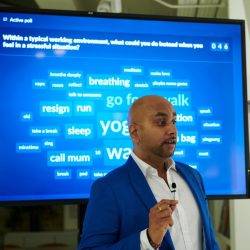November 21, 2018
Organisations with supportive approach most likely to attract talent
 Employers must raise their offering to meet the demands of millennials, as they reach a pivotal time in their careers and demand their employers stand for a purpose. This is according to the 2018 Organisational Wellbeing & Talent Insights Report from Gallagher which finds that to have any impact with this audience, organisations must demonstrate a strong employer value proposition. This is essentially, ‘how you want to be seen’; a set of values lived by workers, driven from the top down. The best organisations match these goals by becoming ‘destination employers’ that are able to win over talent with a more supportive approach. (more…)
Employers must raise their offering to meet the demands of millennials, as they reach a pivotal time in their careers and demand their employers stand for a purpose. This is according to the 2018 Organisational Wellbeing & Talent Insights Report from Gallagher which finds that to have any impact with this audience, organisations must demonstrate a strong employer value proposition. This is essentially, ‘how you want to be seen’; a set of values lived by workers, driven from the top down. The best organisations match these goals by becoming ‘destination employers’ that are able to win over talent with a more supportive approach. (more…)









 Business leaders have called today for the Government to update health and safety legislation to protect mental health in the workplace. In an
Business leaders have called today for the Government to update health and safety legislation to protect mental health in the workplace. In an 






 Only one in four organisations have adapted performance management processes to consider staff with disabilities and special needs, including conditions such as dyslexia and autism. These are the findings of research carried out by Acas which has today published new advice to address the issue. The research report entitled ‘Improvement required?’ included a survey, which asked employers about performance management systems within their workplaces. The study found that one in ten employers said that their performance management system was demotivating for staff; and only one in ten employers said that their systems were used for planning and monitoring training and development.
Only one in four organisations have adapted performance management processes to consider staff with disabilities and special needs, including conditions such as dyslexia and autism. These are the findings of research carried out by Acas which has today published new advice to address the issue. The research report entitled ‘Improvement required?’ included a survey, which asked employers about performance management systems within their workplaces. The study found that one in ten employers said that their performance management system was demotivating for staff; and only one in ten employers said that their systems were used for planning and monitoring training and development.




 Figures from Macmillan show that almost 900,000 people of working age (16-64) are living with cancer – a figure expected to rise to over a million by 2030, while the HSE disclosed 600,000 workers needed time off in the past year due to suffering from work-related stress, depression or anxiety. Men are notoriously bad at checking their health but according to Bupa an increasing spotlight on issues such as prostate cancer and testicular cancer earlier this year led to an increase in male health assessment bookings. In March 2018, Bupa saw a 28 percent uplift in male health assessment bookings compared to the same time last year, and a 43 percent year-on-year increase in April 2018. But according to the healthcare provider, employers must more efforts to help create a culture where male workers can open up about mental or physical problems.
Figures from Macmillan show that almost 900,000 people of working age (16-64) are living with cancer – a figure expected to rise to over a million by 2030, while the HSE disclosed 600,000 workers needed time off in the past year due to suffering from work-related stress, depression or anxiety. Men are notoriously bad at checking their health but according to Bupa an increasing spotlight on issues such as prostate cancer and testicular cancer earlier this year led to an increase in male health assessment bookings. In March 2018, Bupa saw a 28 percent uplift in male health assessment bookings compared to the same time last year, and a 43 percent year-on-year increase in April 2018. But according to the healthcare provider, employers must more efforts to help create a culture where male workers can open up about mental or physical problems.









November 8, 2018
Your relationship with your boss may be playing a role in your stress levels
by Martin Turner and Matthew Slater • Comment, Wellbeing
(more…)